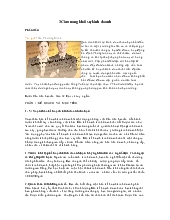Luận án Các nhân tố tác động đến đổi mới sáng tạo của nhóm trong lĩnh vực dịch vụ bán lẻ: Bằng chứng từ Việt Nam
- Người chia sẻ :
- Số trang : 182 trang
- Lượt xem : 15
- Lượt tải : 500
Các file đính kèm theo tài liệu này
 luan_an_cac_nhan_to_tac_dong_den_doi_moi_sang_tao_cua_nhom_t.docx
luan_an_cac_nhan_to_tac_dong_den_doi_moi_sang_tao_cua_nhom_t.docx CV gửi Cục CNTT-BGDĐT-05-10.pdf
CV gửi Cục CNTT-BGDĐT-05-10.pdf Tom tat luan an tieng Anh.docx
Tom tat luan an tieng Anh.docx Tom tat luan an tieng Viet.docx
Tom tat luan an tieng Viet.docx Trang thong tin dong gop moi.docx
Trang thong tin dong gop moi.docx
- Tất cả luận văn được sưu tầm từ nhiều nguồn, chúng tôi không chịu trách nhiệm bản quyền nếu bạn sử dụng vào mục đích thương mại
Bạn đang xem trước 20 trang tài liệu Luận án Các nhân tố tác động đến đổi mới sáng tạo của nhóm trong lĩnh vực dịch vụ bán lẻ: Bằng chứng từ Việt Nam, để xem tài liệu hoàn chỉnh bạn click vào nút DOWNLOAD LUẬN VĂN ở trên
Team innovation can help contemporary organizations create competitive advantage, making them survive, and subsequently growing in the fast-changing and unpredictable market. This thesis aimed to explore different antecedents of team innovation through three studies conducted in retail services in Vietnam. Firstly, drawing upon the ambidextrous leadership for innovation, Study 1 investigates the role of opening and closing leadership behaviors in both team exploratory and exploitative learning, and subsequently in team innovation. Results based on a survey data set collected from 296 team leaders show that opening leadership behavior positively affects team exploratory learning and closing leadership behavior underlies team exploitative learning. Further, the interaction between opening and closing leadership behaviors positively affects both team exploratory and exploitative learning. Finally, these two types of team learning enhance team innovation. Secondly, employing social exchange theory in teams, Study 2 examines the role of shared team psychological contract fulfillment and team proactive personality in the relationship between inclusive leadership and team innovation. Results, based on a survey dataset collected from 300 team leaders in retail services in Vietnam, demonstrated that shared team psychological contract fulfillment mediated the above relationship. Interestingly, team proactive personality positively moderated the effect of inclusive leadership on shared team psychological contract fulfillment. Finally, using the psychological capital (PsyCap) theory, Study 3 investigates the impact of team PsyCap on team innovation. Further, Study 3 also examines the mediating role of team learning, including exploratory and exploitative learning, in team innovation. A sample of 272 team leaders of firms in Vietnam was surveyed to validate the measures via confirmatory factor analysis and to test the model and hypotheses using structural equation modeling. The results demonstrate that team PsyCap has a positive effect on team innovation. Further, team exploratory learning mediates the relationship between team PsyCap and team innovation; however, team exploitative learning does not. Although team exploitative learning is explained by team PsyCap, it does not enhance team innovation. The overall findings of this thesis provide a number of theoretical contributions to the literature on team innovation. Firstly, Study 1 extends the current research on ambidextrous leadership, team learning and team innovation. Secondly, the findings of Study 2 provide further evidence to confirm the predictive power of inclusive leadership at the team level by verifying the role of inclusive leadership in shared team psychological contract fulfillment and innovation. Finally, Study 3 further confirms the predictive power of PsyCap at the team level by verifying the role of team PsyCap in team learning and innovation. This finding of Study 3 signals that to achieve innovation, teams should pursue explorative learning. The findings of this thesis suggest a number of implications for practitioners. Firstly, the findings of Study 1 identify the importance of firms investing in training team leaders to improve both opening and closing leadership behaviors in order to foster exploratory and exploitative learning activities in their teams. Secondly, the results of Study 2 point to the potential for leadership training interventions to improve inclusive leadership behaviors in order to foster the needs and attitudes of their team members. Finally, the results of Study 3 highlight the importance of fostering team PsyCap to enhance team-level outcomes including team learning and innovation. Firms should create a social context that could help in interacting and communicating among team members, which in turn leads to share the perceptions regarding psychological state of development. Study 3 believes that the effect of team PsyCap in shaping agreement between employees in team could help teams get through difficult times and respond more positive to today’s more complex job requirements and increasing demand for change and idea generating and idea implementing.



